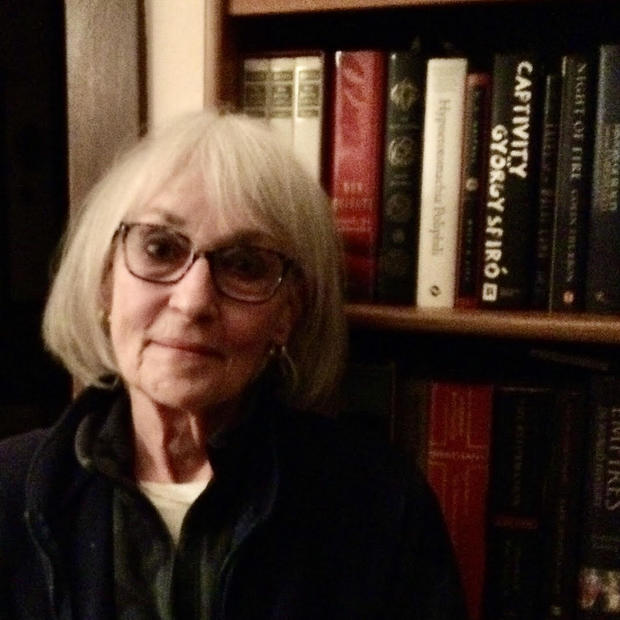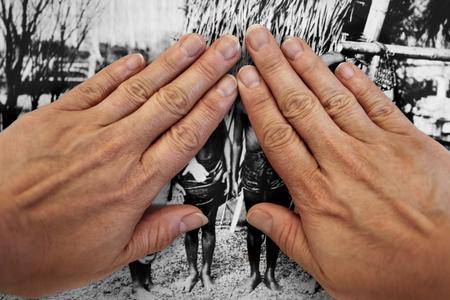The annual holy month of Ramadan begins today and will last 28 or 29 days depending on sightings of the coming crescent moon. Ramadan is a period of fasting, spiritual reflection, and worship during which Muslims abstain from food, drink, and sexual relations each day from dawn to sunset. Because the holiday is determined by the lunar calendar, the time shifts every year, so it's merely coincidental that the annual public open house at Bellevue's Eastside Islamic Center was held less than a week ago.
On my arrival at the mosque for last Saturday's presentations and Q&A about Islam in America, which would be followed by a buffet lunch, a smiling man steered me away from the main entrance and gestured toward the rear of the modest white building. The women’s event was separate from the men’s. A path marked by bright yellow arrows printed with the word “Ladies” led to a small porch, where I removed my sandals and climbed the back stairs to the women’s section.
Topics for the day ranged from the Five Pillars of Islam to Sharia Law, Jihad, and Women in Islam. Some questions were more pointed than might have been expected in religious surroundings, but the discussion was infused with the peaceful joy radiating from the Muslim women present – two co-leaders and about ten women seated among 30 or so visitors in the audience.
When I observed that the omission of Men in Islam as an agenda topic might imply that Muslims consider maleness to be the human norm and femaleness to be deviant, discussion co-leader Mualima Bahiyya (wife of the mosque's imam) cheerfully explained that the program separated out feminine issues only because non-Muslims have so many misconceptions about the treatment of Muslim women. Rights and responsibilities under Islam apply to all Muslims equally, Bahiyya said.
"Then how do you justify honor killing?” asked one skeptic. Other visitors brought up the Saudi prohibition against women driving automobiles and the brutal enforcement in some societies of a requirement that women be covered in public.
Co-leader Leslie Taylor, an American-born convert to Islam who, like Bahiyya, wore hijab (a head scarf and a loose gown), replied that those actions do not accord with Islamic traditions; instead they belong to particular cultural and political groups, including some that aren’t Muslim. “Driving a car is not against Islam,” remarked one of the women in the audience who, like the co-leaders, were wearing hijab.
Distinguishing between the religion of Islam and the politics, culture, and legal systems of the places where the religion lives was a recurrent theme. One American in the audience, who had married a Saudi and lived several years in Saudi Arabia, called the government there corrupt and some cultural aspects backward. “These people came out of the desert 50 years ago," she said. "My husband’s father lighted his house with kerosene lamps. His dad owned slaves. Give them a little time!”
On the other hand, the Muslim women present did not see the separation of men and women or wearing hijab as throwbacks to a more primitive era. When a guest with springy salt-and-pepper hair and a peppery voice commented that she had become a Reformed Jew to avoid the separation of the sexes associated with Orthodox Judaism, Taylor explained that gender-separated worship services and social events let Muslims focus undistracted on the meaning of the activity at hand. “I prefer worshiping with my sisters, without sweaty guys or cute guys nearby,” she said.
Islamic law does not force women to wear hijab, Taylor continued. “The motive must come from within.” Bahiyya added that most of the women in her family don’t wear hijab. What's more, Islamic law forbids insulting or assaulting a woman who does not wear a scarf or gown.
So why voluntarily cover themselves? Women want to divert the gaze of men from their bodies, Bahiyya explained. “Islam is sophisticated about human psychology. Men are very visual, as scientific research has shown. It’s just human nature. I cover so they won’t stare at me.” In turn, Islam requires men to show respect toward women by lowering their eyes when the sexes encounter each other, and a Muslim man is taught to treat women, even those who aren’t Muslims, with respect.
A scarfed and gowned woman in the audience described her own experience of being cloaked in public places. “Covering lets me think about my character and values more than my appearance. At home, where I wear other things, my husband sees me in a special way, and I feel a deeper intimacy with him. There’s also less jealousy between women in the outside world.”
A discussion of the recent French ban on veiling struck some sparks. Bahiyya argued that women everywhere should have the right to cover their faces if they wish, but a slender, clear-voiced woman who had recently returned from Beirut and Paris argued otherwise. “Rights extend to other people, too. It’s my right to have my child taught by a teacher who has a face. On the bus, it’s my right to know whether I’m sitting next to a man or a woman. Regardless of faith, there are dress codes in every society. People can’t go around naked.”
Bahiyya responded, “My friend in France gets fined regularly for wearing her veil when she goes to the grocery store. She just pays the fines." In any case, she smilingly added about her own wearing of hijab, “It’s my choice. I don’t expect you to change your Constitution for me.”
The Muslims in the room expressed pride in the modernity of women’s rights under Islam. “I was raised Catholic,” said a woman wearing a head scarf. “Many of the rights Muslim women had 1400 years ago were extended to Christian women only during the past century.” Women’s rights under Islam include the right to get an education, to own property independently, to work, to keep the money they earn, to express their opinion and be heard, to accept or reject marriage proposals, to be satisfied by their husbands, to divorce, and to obtain custody of their children after divorce. “It’s in countries where the governments are corrupt that you don’t see these rights enforced,” the former Catholic concluded. Bahiyya added that husbands also consult their wives when making decisions, as the prophet Mohammad sought advice from his most trusted wife when he and fellow pilgrims were denied entrance to Mecca.
During a wide-ranging discussion of jihad, Bahiyya explained that "the word means ‘struggle,’ and it is of two kinds”: the struggle against external oppression and the "much more difficult" internal struggle with one’s own nature to act in accord with God’s commandments. For a Muslim, protecting one’s own beliefs and one’s Islamic community sometimes entails jihad. But Islam forbids the killing of women and children as well as the destruction of buildings, trees, and infrastructure, she said. So the extreme violence of some jihadists, with their indiscriminate use of prohibited weapons such as bombs, is in blatant violation of Islamic law.
Within such limits, the first rule of Islam is to ensure the safety of all people in the community, Bahiyya said. Such protection is of paramount importance even in cases where some rights of individuals must be curtailed in order to deal realistically with the baser aspects of human nature. For example, Salman Rushdie should not have used his right to freedom of expression for the purpose of ridiculing Mohammad in The Satanic Verses. “We disagreed with the authorities in Iran who threatened to have Rushdie killed,” said Bahiyya, “but his insulting language should have been subject to legal action of some kind.” She compared prohibitions in France against denying the Holocaust (and in the U.S., of course, certain kinds of hate speech are illegal, as are threats and blackmail).
In any case, Muslims individually and as a community are expected to ensure that their practices do not break local laws, Bahiyya said. “We have to abide by the law of the country we live in.”
A few stereotypes about American intolerance were upended. One woman asked Bahiyya whether Americans are rude to her when she’s covered in public. “Not in Bellevue,” she replied, “but sometimes when I’m traveling.” Taylor said that though some students at the University of Washington, where she received her Masters degree, have questioned her decision to wear hijab, their interest has been purely informational.
According to other women present, non-Muslim America has been generally supportive of their dress and beliefs. An American Egyptian in the audience who is an engineer described an encounter with a boss in Baltimore who was a World War Two veteran. “[He said] if you ever have trouble about what you wear, in this office or on the outside, tell me and I'll take care of it."
"We’re blessed to live in a country that accepts our difference," Taylor said gratefully.
Even in the aftermath of the 9/11 attacks, Bahiyya felt the wider community rally around her family and friends. “The Mormon church next door came right over to the mosque to offer support. At home, my neighbors were knocking on my door asking if they could help. ‘Do you need someone to go to the store with you?’ they asked.” Taylor recalled the human chain that neighbors formed around the Idriss Mosque near Northgate to keep the building from being vandalized.
Saturday's open house was part of a nearly decade-long public outreach tradition of the Eastside Islamic Center. Public feedback indicates that people’s misunderstandings are cleared up and that guests leave with a better understanding of Islam. “It opens up their minds,” Imam Fazal Hassan told me before I left. “Ignorance breeds hatred.”
If you go: Community members are welcome to learn more by visiting the Eastside Islamic Center, 14700 Main St., Bellevue. In addition, at the conclusion of Ramadan – probably on August 19, but the date has not yet been determined – the public is invited to the annual feast of Eid ul-Fitr. Details about the time and location of the feast will be posted on the Eastside Islamic Center website in mid-August.



